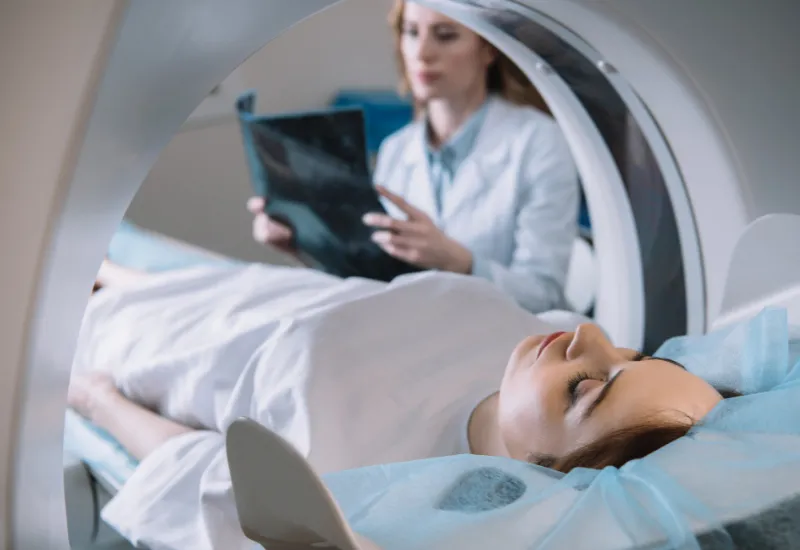Magnetic resonance imaging (MRI) has revolutionized medicine with its radio wave technology that can produce in-depth pictures of body organs, including the chest, lungs, spleen, kidneys, pancreas, brain, and much more. This article focuses on a detailed analysis of an MRI chest scan, its cost, and how it is carried out.
What is Chest MRI?
MRI chest scan is a non-invasive and nonpainful procedure that diagnoses medical conditions using radiofrequency impulses, a strong magnetic field, and a specialized computer. MRI does not involve the use of X-rays.
A chest MRI produces detailed images of the structure within the chest cavity, which allows doctors to examine and diagnose any medical complications.
What does a Chest MRI show?
A chest MRI produces high-resolution images (taken from almost every angle) of the structures within the chest cavity, including pleura, chest wall, mediastinum, heart, and blood vessels. It also shows movie-like sequential imaging of an individual's cardiovascular system and chest vascular anatomy, which aids in assessing the health, functioning, and structure of valves, blood vessels, the heart, etc.
What are the uses of chest MRI?
Chest MRI is a medically advantageous procedure and provides insight into potentially harmful or even life-threatening conditions. Following are some common uses of MRI chest scans.
-
To characterize and view those abnormal masses which cannot be analyzed adequately with the standard CT scan procedures or other imaging technologies.
-
To work out the anatomy and functioning of the heart along with its component structures, including valves, blood vessels, etc.
-
To ascertain the size of tumors and the degree and extent of their spread to neighboring structures or organs.
-
To determine disorders of the soft tissues of the chest wall (fat and muscle) and chest bones, including ribs, sternum, and vertebrae
-
Verify the pleural or mediastinal lesions identified by other imaging technologies, including CT scans or chest X-rays.
-
To check for pericardial disease. The pericardial is the thin sac around the heart.
-
To assess blood flow dynamics in the heart chambers and blood vessels.
-
To discover myocardial infarct (scars that develop in the heart muscle because of prior damage or hindered blood flow) and myocardial perfusion (blood flow to the heart)
-
To view blood vessels and lymph nodes, along with the lymphatic and vascular disfigurements of the chest.
How much does a chest MRI cost?
Magnetic resonance imaging is an expensive imaging technique. The cost ranges between $400 to $10,500 depending upon the procedure's location and the part of the body to be examined. Since an MRI machine costs more than $1 million on average, high prices are charged for these scans to cover the expenditure of the machine.
An MRI with contrast costs more, as the expense of the gadolinium-contrast agent is added into the total bill. The cost of medical staff such as radiologists, MRI technicians, nurses, and administrative costs are also included in the total cost of an MRI procedure.
Following are the standard price ranges of MRI procedures of different body parts in the United States.
-
Chest MRI costs between $500 and $7,900.
-
Brain MRI typically costs between $1,600 and $8,400.
-
The expense of a cardiac MRI is between $430 and $6,500.
-
Breast MRI costs about $500 and $10,300 on average.
-
An abdominal MRI costs between $1,600 and $7,600.
-
A neck MRI procedure costs between $500 and $11,800.
-
The cost of a pelvic MRI is between $500 and $7,900.
-
Pelvic MRI costs approximately $500 and $7,900.
-
An MRI of the upper extremity typically costs between $1,050 and $7,000.
-
An MRI of the lower extremity costs between $975 and $6,300.
-
Bone MRI costs anywhere between $410 and $2,100.
The pricing summary of the National Chest MRI procedure suggests the minimal national price to be $500, the national average price to be around $2,850, and the national maximum price to be $7,900. If you are looking for an ideal place to get a chest MRI scan, Cura4U is the place for you. Certified medical practitioners at Cura4U provide the best quality healthcare at the lowest possible prices. For example, you can get a chest MRI done for only $500 in Florida. Head over to Cura4U right now to book your slot and avail this splendid opportunity!
How long does a chest MRI take?
A chest MRI is a non-invasive procedure and does not take long. The standard time for this process is between 30 to 60 minutes but may take longer depending upon the area of the body you are getting tested.
How should you prepare for a chest MRI?
You need to comply with specific guidelines when getting a chest MRI done. You need to change into a hospital gown to prevent disruptive artifacts from appearing on the images. Before the scan, you will also be required to remove any metal objects, jewelry, or other accessories, as metallic and electronic items are not allowed in the testing room.
Although there are no specific restrictions on eating and drinking before getting tested, it is advisable to consult with your medical professional beforehand. A contrast material called gadolinium or iodine is administered to a patient in a chest MRI with contrast. You need to tell the doctor if you have allergies to contrast material or other drugs, environment, or food. You also need to tell the doctor if you suffer from any serious medical issues or have had surgery recently. If you have claustrophobia, you can ask your doctor to prescribe a mild sedative.












